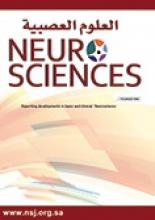Abstract
OBJECTIVE: To generate an Arabic version of the Dizziness Handicap Inventory (DHI), and to assess its reliability by applying it to a group of patients with vestibular disorders and control healthy subjects of Arabic origin.
METHODS: The Arabic version of the DHI was developed using the standard protocol for test translation. This pilot study was carried out between January 2009 and January 2011 at the Otology/Neurotology Clinic at King Abdulaziz University Hospital, Riyadh, Kingdom of Saudi Arabia. The translated version was then tested using 50 patients with vestibular disorders, and 50 control subjects. Participants’ responses were statistically analyzed for internal consistency within and between the patient and control groups.
RESULTS: An Arabic DHI showed a significantly high internal consistency and reliability. Cronbach’s alpha coefficient with 95% confidence interval for functional score among patients was 0.87 (0.81-0.92), 0.81 (0.72-0.88) for physical score, 0.79 (0.69-0.87) for emotional score, and 0.92 (0.89-0.95) for the overall DHI score. A significant difference was found in domain scores and total DHI score between the dizzy and control groups (p=0.00).
CONCLUSION: The Arabic version of the DHI is a valid and reliable self-assessment tool for the severity of vestibular disorders.
- Copyright: © Neurosciences
Neurosciences is an Open Access journal and articles published are distributed under the terms of the Creative Commons Attribution-NonCommercial License (CC BY-NC). Readers may copy, distribute, and display the work for non-commercial purposes with the proper citation of the original work.






